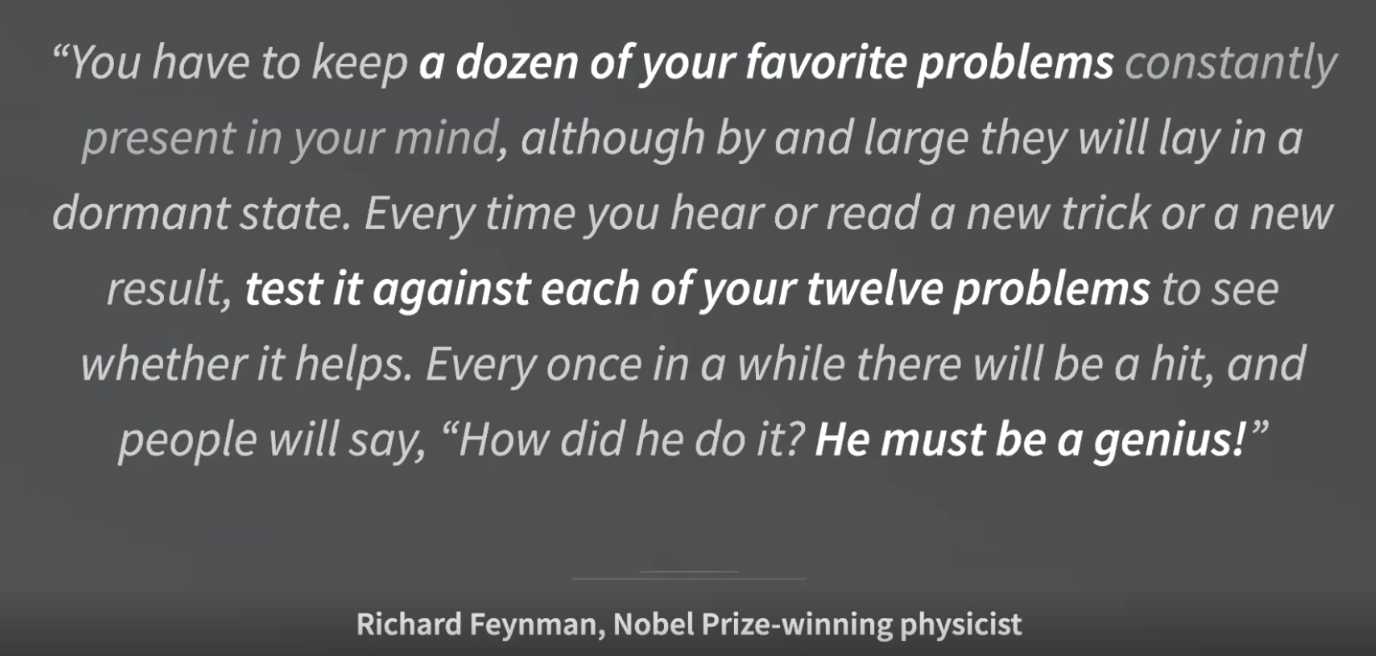Feynmans 12 favorite problems
Richard Feynman (Biographie)
Deep and wide. Explored so much the live has to offer.

“You have to keep a dozen of your favorite problems constantly present in your mind, although by and large they will lay in a dormant state. Every time you hear or read a new trick or a new result, test it against each of your twelve problems to see whether it helps. Every once in a while there will be a hit, and people will say, “How did he do it? He must be a genius!”
Richard Feynman, Nobel Prize-winning physicist
- keep a dozen of your favorite problems/open questions present in your mind
-
test it against each of your twelve problems
- Read Feynman: Biographie: [[Richard Feynman - John Gribbin Mary Gribbin]]
- What are my recurring, long term interests/open questions?
Nice open ended questions to define or find my 12 questions
How can I…?
How might we…?
How can my organization…?
How can I help others to…?
How does X relate to Y?
How do I…?
What does it look like to…?
What would be possible if…?
What do I want with…?
What would I do if…?
What would happen if…?
What would have to be true to…?
Summarized version
Keep a list of around a dozen favorite problems or open questions that interest them over the years. These questions are like recurring long-term interests that they continuously explore.
The writer further explains that whenever they come across new information, whether it’s from reading books, articles, listening to podcasts, or other sources, they ask themselves if the information has any relevance to their list of favorite problems. They use this as a tool to filter and evaluate the relevance of the incoming information to their unique interests and curiosities.
While most of the time the answer is “no,” the writer emphasizes that when they make a connection between the new information and one of their favorite problems, it often leads to unexpected and profound breakthroughs. These connections can be original and interesting, helping them deepen their understanding, generate new ideas, or make discoveries in the areas they are passionate about.
In this way, the writer’s strategy mirrors Feynman’s advice of constantly testing new information against their list of favorite problems, allowing them to explore various fields and interests while remaining focused on their personal areas of curiosity and inquiry.
Linking
- Get started with these prompts (What were you obsessed with as a child or teenager? What are the longest-running hobbies you’ve had in your life? +8 more)
- Formulate your own “How/What” questions
- Make your questions specific, counter-intuitive, or cross-disciplinary
- Start capturing information relevant to your favorite problems